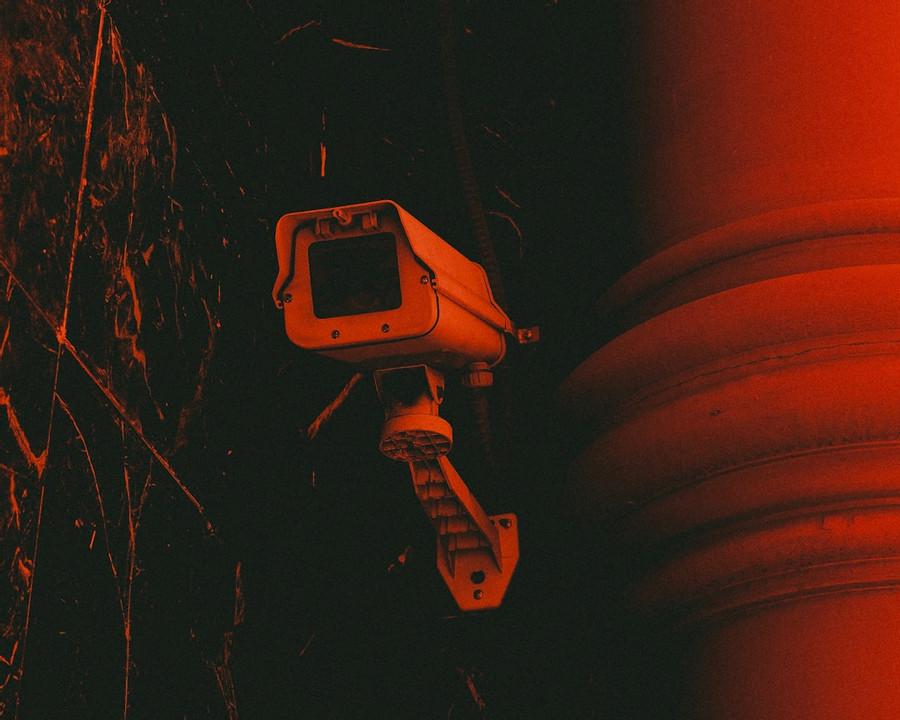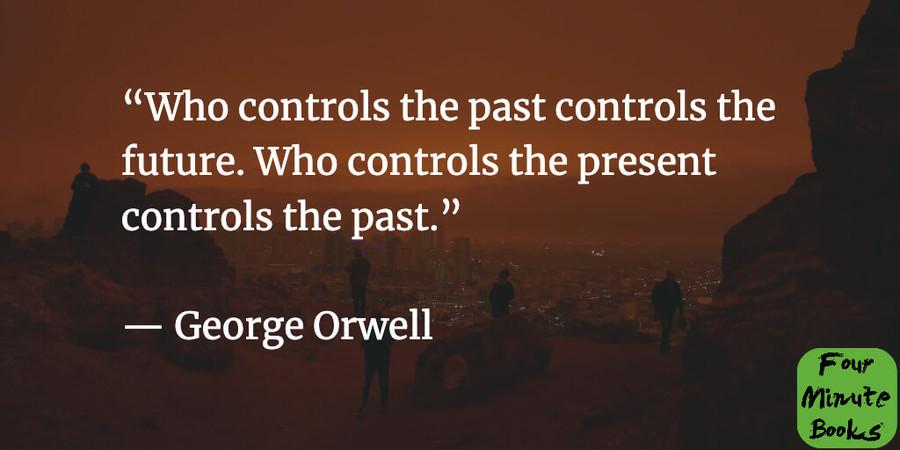1984 Summary
Curated from: fourminutebooks.com
Ideas, facts & insights covering these topics:
31 ideas
·511 reads
1
1
Explore the World's Best Ideas
Join today and uncover 100+ curated journeys from 50+ topics. Unlock access to our mobile app with extensive features.
1984 - Book Summary
1984 is the story of a man questioning the system that keeps his futuristic but dystopian society afloat and the chaos that quickly ensues once he gives in to his natural curiosity and desire to be free.
4
54 reads
Author Quote
"Who controls the past controls the future. Who controls the present controls the past."
-George Orwell
4
47 reads
Book Overview
“The best books are those that tell you what you know already,” Winston Smith concludes as he finally leafs through the pages of a forbidden book he’d been dying to get his hands on. In that sense, 1984 by George Orwell is indeed a great book: Most of us know the word “totalitarian” indicates something bad, but only after reading a dystopian classic like this will we truly understand what an absolute government might look like in practice.
4
30 reads
Orwell had been an Imperial policeman in Burma (modern-day Myanmar) and fought in the Spanish Civil War. He later worked as a journalist during World War II. As such, he had seen the terrifying impact of governments with complete control both first- and second-hand in Spain, Russia, and Germany.
4
26 reads
Published in 1949, 1984 was his warning to Western nations not to succumb to then-popular communist ideas. Despite leaning more left than right himself, Orwell feared unquestioned socialism would, ultimately, escalate into a government practicing systematic oppression — and could do so within the next 35 years.
4
23 reads
Top 3 Book Lessons
- The most powerful way to either control or empower humans is language.
- Freedom is the ability to say what’s true, to say what you think, and to make your own choices.
- Totalitarian governments succeed when they turn off our individuality via gaslighting.
5
29 reads
Lesson 1: Language is the defining
The book is structured into three parts, and in the first, we get to know the protagonist Winston Smith. At nearly 40 years old and in bad physical shape, Winston is somewhat of an anti-hero. He works in the Ministry of Truth in London, which is part of Oceania, one of three large superstates , who are constantly at war with one another.
4
23 reads
Winston’s job at the record department is to, ironically, falsify historic records. The goal is to erase everything that contradicts or makes “the Party,” the governing political power, look bad. Originals are burned in giant furnaces, and every newspaper article gets rewritten every time the Party decides a new reality is in order.
4
21 reads
One of Winston’s colleagues works on the Party’s latest edition of the “Newspeak” dictionary. Newspeak is a language devised specifically to eliminate rebellious thinking at the root. Think about it: If you didn’t have the vocabulary to express an idea, wouldn’t that also make you less likely to think of that idea in the first place?
4
16 reads
For example, if the word “freedom” was erased from the English language, would Americans still understand it the way it was meant in the Constitution? In the book, the word “free” still exists, but by means of deleting many other words associated with it, future “Newspeakers” would only be able to use it “in such statements as ‘This dog is free from lice.'” Political or intellectual freedom “no longer existed even as concepts, and were therefore of necessity nameless.”
4
17 reads
The form of language shapes how we can express ourselves, and how we can express ourselves shapes how and what we think. Therefore, language may be the single-most important way to either empower or enslave humans. This concept is called linguistic relativity . It’s a little overstated, but in a way, “if you have no means of saying it, you can’t think it.”
4
15 reads
Lesson 2: Freedom means being able to say what’s true
Besides altering language and falsifying history, the Party also controls its citizens via more direct means. For one, everyone could be a spy, and children regularly report their parents to “the Thought Police,” a sort of Gestapo which makes inconvenient people vanish at a moment’s notice.
Another theme in the book is using technology to practice mass surveillance . Every home has a “telescreen,” a monitor that’s both recording and broadcasting at all times, and there are cameras and microphones everywhere.
5
15 reads
At first, Winston thinks Julia is a spy, but when she gives him a love note, the two begin meeting in secret, sleeping together, and commiserating about how much they hate the Party. There is, however, one key difference between them: Julia has no interest in overthrowing the Party. “If you keep the small rules you can break the big ones,” she observes, and as long as she can do what she wants right under the Party’s nose, she is happy .
4
11 reads
Winston, however, more desperately wishes for a better future — not that he could do much to bring one about. Julia’s definition of freedom begins and ends with her choices, whereas Winston thinks freedom also means being able to think and say what is true and what you truly believe. “Freedom is the freedom to say that two plus two make four. If that is granted, all else follows,” he writes into his diary. “To die hating them,” the Party, that is, “that was freedom.”
4
10 reads
If a government allows its citizens limited means to form an identity and actualize themselves, its people still isn’t free. Freedom includes permission to speak both facts and lies, to say what you think irrespective of whether it is right or wrong, and without these freedoms, all the others mean significantly less.
4
10 reads
Lesson 3: A totalitarian state wins when it can gaslight
In 2020, just as the pandemic came into full force, Julio Vincent Gambuto told us to “prepare for the ultimate gaslighting .” “Pretty soon, as the country begins to figure out how we ‘open back up’ and move forward, very powerful forces will try to convince us all to get back to normal.” Of course, normal had disappeared, Gambuto warned. The future would — and probably should — look very different, but if we let greedy, marketing-savvy corporations steamroll us yet again, we’d gain nothing from the great pause we had been given.
4
10 reads
In this case, the evil Gambuto referred to was consumerism, but gaslighting, defined as “manipulating someone using psychological methods into questioning their own sanity or powers of reasoning,” is also what totalitarian governments use to bend citizens to their will.
4
12 reads
Just before, in the last part of the book, the inevitable happens — Winston and Julia get caught by the Thought Police — Winston concludes that “sanity is not statistical.” What he means is that “there is truth and there is untruth, and if you cling to the truth even against the whole world, you are not mad.” If your government can make you think you’re mad, however, it just might get you to give up the truth in favor of a lie that’s more convenient for them. This is how totalitarian governments win: They get you to reject not just the truth but any kind of individual thinking whatsoever.
4
11 reads
After their capture, Winston and Julia are separated, and both are tortured into not just compliance but becoming mindless Party drones like everyone else. As it turns out, Winston’s coworker O’Brien, whom he thought to be a fellow secret rebel, is actually a high-level Inner Party member, eager to brainwash him into loyalty to the Party.
4
10 reads
Having had little individuality to begin with due to the short material leash the state kept him on, Winston is now forced to give up his last shred of self thanks to months of physical and psychological abuse. O’Brien doesn’t just get him to lie about basic reality, such as claiming he holds up five fingers when he’s only holding up four, but also to pretend Oceania has always been at war with the same enemy when, in fact, telescreens frequently announce differing warring factions.
4
8 reads
The ultimate gaslighting, however, happens when he makes Winston doubt reality altogether and, as such, the importance of thinking for himself: “If he THINKS he floats off the floor, and if I simultaneously THINK I see him do it, then the thing happens,” Winston muses. “It doesn’t really happen. We imagine it. It is hallucination. What knowledge have we of anything, save through our own minds? All happenings are in the mind. Whatever happens in all minds, truly happens.”
4
8 reads
This is Winston’s final admission of defeat. After all, if the Party can rewrite history as it sees fit, it can dictate “whatever happens in all minds” and, therefore, what “truly happens.” When he returns to the real world, he is happy to drink the same gin he has always been drinking, sit at the same bar he’s always been sitting in, and no longer cares about expressing himself in any way whatsoever. Not with Julia. Nor in a diary. Not even through rebellious thoughts.
4
8 reads
When other people gaslight us, it’s annoying and sad. When our governments do it, it’s dangerous, an immediate sign to take a stand and cling to the truth with all we’ve got. Always think twice about what your government does and says. Big Brother is watching.
4
8 reads
1984 - Book Review
Besides the fact that it is well-structured, relatively easy to understand, and successfully relies on a few strong characters to drive its points home, 1984 has held up incredibly well over time, and not just because of its predictive powers. If you read the book today, you’ll hardly feel transported to a different century. While Winston isn’t exactly carrying around a smartphone, the book’s everyday backdrop still feels technologically close enough to today to make it easy to immerse yourself in its world.
4
9 reads
All in all, this is an outstanding book with several important, cautionary messages, some of which we should heed today. What happens if news blogs change their headlines after publication? What role does misinformation play in elections? Can our smartphones listen to us while we sleep? All of these are questions Winston Smith would ask were he alive in our world today. Reading his story will help us answer them.
4
8 reads
While I would recommend this book to anyone, you’ll find it an especially great read if you’re concerned about freedom and sovereignty . For more context on its publication and Orwell’s ideas, check out Wikipedia . You can also dive into our list of the best and most important quotes from the book . Final fun fact: It is one of the top 15 books recommended by Jordan Peterson .
4
8 reads
Who would I recommend our 1984 to?
The 17-year-old climate activist who’s not happy with how their government is handling global warming, the 55-year-old who thinks their government will surely take care of them in retirement, and anyone who’s suspicious of technology’s long-term impact on our mental and societal health.
4
9 reads
IDEAS CURATED BY
CURATOR'S NOTE
1984 by George Orwell - Book Summary
“
Tom Joad's ideas are part of this journey:
Learn more about sciencefiction with this collection
How to overcome unwanted thoughts
How to manage intrusive thoughts
How to change your attitude towards intrusive thoughts
Related collections
Similar ideas
Read & Learn
20x Faster
without
deepstash
with
deepstash
with
deepstash
Personalized microlearning
—
100+ Learning Journeys
—
Access to 200,000+ ideas
—
Access to the mobile app
—
Unlimited idea saving
—
—
Unlimited history
—
—
Unlimited listening to ideas
—
—
Downloading & offline access
—
—
Supercharge your mind with one idea per day
Enter your email and spend 1 minute every day to learn something new.
I agree to receive email updates


